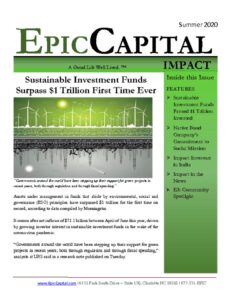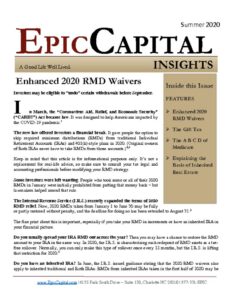The I.R.S. Has Enhanced the 2020 RMD Waivers
Jul 29, 2020
In March, the Coronavirus Aid, Relief, and Economic Security (CARES) Act became law. It was designed to help Americans impacted by the COVID-19 pandemic.1
The new law offered investors a financial break. It gave people the option to skip required minimum distributions (RMDs) from traditional Individual Retirement Accounts (IRAs) and 401(k)-style plans in 2020. (Original owners of Roth IRAs never have to take RMDs from those accounts.)2,3 (more…)
Tags: Current Events, Financial Planning, Personal Finance, retirement, Retirement Planning, taxes
30 Year Home Loans Fall to Historic Lows
Jul 27, 2020
Lately, it can feel like each day brings a new headline about fluctuating market behavior. But amid the ups and downs of 2020, there may be some potential good news on the horizon. On July 16, 2020, the interest rate for 30-year home loans have fallen to 2.98%. In addition, the average interest rate for a 15-year home loan had declined to 2.48%.1,2,3 (more…)
Tags: charlotte NC, financial advisor charlotte nc, Financial Help, Financial Planning, Personal Finance
What is Earnings Season
Jul 22, 2020
Every few months, you may hear the phrase “we’re entering earnings season” as you read financial news.
But what exactly is “earnings season” and why is it important to Wall Street? (more…)
Tags: financial advisor charlotte nc, Investment Portfolio, Personal Finance
What is Reg BI?
Jul 20, 2020
Recently, you may have heard that financial industry regulators established a new set of rules designed to guide investors who work with an investment professional. This new set of rules is called “Regulation Best Interest” rule, known colloquially as “Reg BI.” 1 (more…)
Tags: Current Events, financial advisor, Investing, Personal Finance, Retirement Planning
2020 Mid-Year Outlook
Jul 16, 2020
Whats Driving Current Market Behavior?
Jul 15, 2020
In the era of COVID-19, and the financial woes it has created, I often get asked, “Why is the stock market holding up so well when the economy appears to be struggling?” (more…)
Tags: charlotte NC, Current Events, financial advisor charlotte nc, Personal Finance
Epic Impact – Summer 2020
Jul 15, 2020
Epic Insights – Summer 2020
Jul 14, 2020
CARES Act: Will There Be a Phase 4?
Jul 10, 2020
With the economy and financial markets flashing mixed signals, it’s no wonder that lawmakers are deadlocked on whether to pass a Phase 4 of the CARES Act. (more…)
Tags: Current Events, financial advisor charlotte nc, Financial Help, Financial Planner Charlotte NC, Financial Planning
An Unprecedented Rush to Cash
Jul 3, 2020
As Americans adjust their spending habits in a rapidly changing economy, they are building cash reserves at an unprecedented rate.
The Bureau of Economic Analysis reported on May 29th that the personal savings rate hit a historic 33% in April. To put that into perspective, it’s the highest number since the Bureau started tracking personal savings in the 1960s.1 (more…)
Tags: financial advisor, Income Planning, Investing, Personal Finance
More Insights
Few terms in personal finance are as important, or used as frequently, as “risk.” Nevertheless, few terms are as imprecisely defined. Generally, when financial advisors or the media talk about investment risk, their focus is on the historical price volatility of the asset or investment under discussion.
As Americans get their grills and beach chairs ready for the July 4th holiday, the stock market and the weather across much of the country have both been on heaters. Stocks and bonds continue to effectively navigate a complex policy landscape shaped by evolving trade dynamics, geopolitical tensions, and fiscal stimulus. The market’s resilience in … Continue reading “Market Update – America Gets Record High Stock Prices for Its Birthday”
Birthdays may seem less important as you grow older. They may not offer the impact of watershed moments such as getting a driver’s license at 16 and voting at 18. But beginning at age 50, there are several key birthdays that can affect your tax situation, health-care eligibility, and retirement benefits.
During times like these when geopolitical headlines can be unsettling for investors, we at LPL Research like to remind ourselves of one of our key investing principles. Markets have always faced challenges —ranging from geopolitical conflicts and economic downturns to natural disasters, political upheaval and health crises. These events often trigger short-term volatility and shake … Continue reading “Why Long Term Investing Beats Selling in Volatile Times”
Are you concerned about the inheritance taxes your heirs may have to pay? Then you may want to consider creating charitable lead trusts.
Services
Epic Capital provides the following comprehensive financial planning and investment management services: Learn More >




 Top of Page
Top of Page











